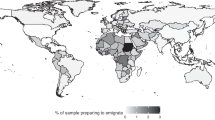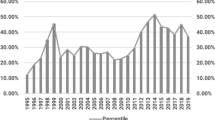Abstract
This paper investigates the Landes-Posner thesis on judicial independence using data on public law decisions in which the government was the defendant decided in the New Zealand High Court over the period 1958–2001. We use survival analysis to examine whether successive New Zealand governments have promoted judges from the High Court to the Court of Appeal (which stands above the High Court) on the basis of political considerations, the quality of the judge's decision-making or both. Our findings suggest that the quality of decision-making has generally been important. Consistent with the weak form of the Landes-Posner hypothesis we find no evidence that governments have used their powers to punish judges who decided cases against them. On the contrary, we find some support for the strong form of the Landes-Posner thesis that governments positively use their powers to secure judicial independence.
Similar content being viewed by others
References
Allan, J. (1998). "Why New Zealand Doesn't Need a Written Constitution." Agenda. 5, 487–494.
Anderson, G., Shughart, W. & Tollison, R. (1989). "On the Incentives of Judges to Enforce Legislative Wealth Transfers." Journal of Law and Economics. 32, 215–228.
Atkins, B. (1991). "Party Capability Theory as an Explanation for Intervention Behavior in the English Court of Appeal." American Journal of Political Science. 35, 881–903.
Auckland District Law Society. (2003). Submission to the Courts Committee of the Auckland District Law Society to the Justice and Electoral Committee on the Supreme Court Bill, April.
Ben-Porath, Y. (1967). "The Productivity of Human Capital and the Life Cycle of Earnings." Journal of Political Economy. 75, 352–365.
Cohen, M. (1991). "Examining Judicial Behaviour or What's Unconstitutional About the Sentencing Commission." Journal of Law, Economics and Organization. 7, 183–199.
Cohen, M. (1992). "The Motives of Judges: Empirical Evidence From Antitrust Sentencing." International Review of Law and Economics. 12, 13–27.
Cooter, R. (1983). "The Objectives of Private and Public Judges." Public Choice. 41, 107–132.
Crain, W. M. & Tollison, R. (1979). "Constitutional Change in an Interest Group Perspective." Journal of Legal Studies. 8, 165–175.
Crain, W. M. & Tollison, R. (1979a). "The Executive Branch in the Interest-Group Theory of Government." Journal of Legal Studies. 8, 555–567.
Crain, W. M., Shughart, W. & Tollison, R. (1988). "Legislative Majorities as Non-Salvageable Assets." Southern Economic Journal. 55, 303–314.
Dixit, A., Grossman, G. & Gul, F. (2000). "The Dynamics of Political Compromise." Journal of Political Economy. 108, 531–568.
Dreyfuss, R. C. (1995). "Forums of the Future: The Role of Specialized Courts in Resolving Business Disputes." Brooklyn Law Review. 61, 1–44.
Eichelbaum, T. (Sir) (1993). "Judicial Independence-Fact or Fiction?" New Zealand Law Journal. March, 90-92.
Farmer, J. (2001). "The New Zealand Court of Appeal: Maintaining Quality After the Privy Council." In R. Bigwood (ed.) Legal Method in New Zealand, Auckland: Butterworths, pp. 237–250.
Ferejohn, J. & Shipan, C. (1990). "Congressional Influence on Bureaucracy." Journal of Law, Economics and Organization. 6, 1–20.
Ferejohn, J. & Weingast, B. (1992). "A Positive Theory of Statutory Interpretation." International Review of Law and Economics. 12, 263–279.
Goldfinch, S. (1993). "Judicial Independence and the Administration of the Courts in New Zealand." Political Science. 45, 153–169.
Greenberg, P. E. & Haley, J. A. (1986). "The Role of the Compensation Structure in Enhancing Judicial Quality." Journal of Legal Studies. 15, 417–426.
Hammond, R. G. (1991). "The Judiciary and the Executive." Journal of Judicial Administration. 1, 88–113.
Hanssen, F. A. (1999). "The Effect of Judicial Institutions on Uncertainty and the Rate of Litigation: The Election versus the Appointment of State Judges." Journal of Legal Studies. 28, 205–232.
Hanssen, F. A. (2000). "Independent Courts and Administrative Agencies: An Empirical Analysis of the States." Journal of Law, Economics and Organisation. 16, 534–571.
Hanssen, F. A. (2001). "Is There a Politically Optimal Level of Independence?" The Hoover Institution, Stanford University, Working Paper, April.
Jaffe, L. L. (1969). English and American Judges as Lawmakers.
Joseph, P. (1993). Constitutional and Administrative Law in New Zealand. Sydney: Law Book Company.
Landes, W. & Posner, R. (1975). "The Independent Judiciary in an Interest Group Perspective." Journal of Law and Economics. 18, 875–902.
Lessig, L. (1995). "The Regulation of Social Meaning." University of Chicago Law Review. 62, 943–1045.
Macey, J. R. (1994). "Judicial Preference, Public Choice and the Rules of Procedure." Journal of Legal Studies. 23, 627–646.
McAdams, R.H. (1995). "Cooperation and Conflict: The Economics of Group Status Production and Race Discrimination." Harvard Law Review. 108, 1003–1084.
McCubbins, M., Noll, R. & Weingast, B. (1987). "Administrative Procedures as Instruments of Political Control." Journal of Law, Economics and Organization. 3, 243–277.
McCubbins, M. & Schwartz, T. (1984). "Congressional Oversight Overlooked: Police Patrols versus Fire Alarms." American Journal of Political Science. 28, 165–179.
McDowell, J. (1982). "Obsolescence of Knowledge and Career Publication Profiles: Some Evidence of Differences among Fields in Costs of Interrupted Careers." American Economic Review. 72, 752–768.
Miceli, T. & Cosgel, M. (1994). "Reputation and Judicial Decision-making." Journal of Economic Behavior and Organization. 23, 31–51.
Palmer, G. (Sir) (1995). "Judicial Selection and Accountability: Can the New Zealand System Survive?" In Gray & McClintock (eds.), Courts and Policy: Checking the Balance, Wellington: Brookers.
Palmer, G. (Sir) (2000). "The Legal History and Framework of the New Zealand Constitution." Unpublished manuscript, Chen & Palmer Solicitors, Auckland.
Posner, E. (1998). "Symbols, Signals and Social Norms in Politics and the Law." Journal of Legal Studies. 27, 765–798.
Posner, R. (1994). "What Do Judges and Justices Maximize? (The Same Thing Everybody Else Does)." Supreme Court Economic Review. 3, 1–41.
Posner, R. (2000). "Is the Ninth Circuit Too Large? A Statistical Study of Judicial Quality." Journal of Legal Studies. 29, 711–718.
Ramseyer, M. J. (1994). "The Puzzling (In)dependence of Courts: A Comparative Approach." Journal of Legal Studies. 23, 721–747.
Ramseyer, M. J. & Rasmusen, E. B. (1997). "Judicial Evidence in a Civil Law Regime: The Evidence From Japan." Journal of Law, Economics and Organization. 13, 259–286.
Ramseyer, M. J. & Rasmusen, E. B. (1999). "Why the Japanese Taxpayer Always Loses." Southern California Law Review. 72, 571–595.
Ramseyer, M. J. & Rasmusen, E. B. (2001). "Why is the Japanese Conviction Rate So High?" Journal of Legal Studies. 30, 53–88.
Ramseyer, M. J. & Rasmusen, E. B. (2001a). "Why are Japanese Courts so Conservative in Politically Charged Cases?" American Political Science Review. 95, 331–344.
Richardson, I. (Sir) (1981). "The Role of an Appellate Judge." Otago Law Review. 5, 1–10.
Rogers, J. R. (2001). "Information and Judicial Review: A Signaling Game of Legislative-Judicial Interaction." American Journal of Political Science. 45, 84–99.
Ryder, H., Stafford, F. & Stephan, P. (1976). "Labor, Leisure and Training Over the Life Cycle." International Economic Review. 17, 651–674.
Salzberger, E. (1993). "A Positive Analysis of the Doctrine of the Separation of Powers, or Why Do We Have an Independent Judiciary?" International Review of Law and Economics. 3, 349–379.
Salzberger, E. M. & Fenn, P. (1999). "Judicial Independence: Some Empirical Evidence From the English Court of Appeal." Journal of Law and Economics. 42, 831–847.
Schauer, F. (2000). "Incentives, Reputation and the Inglorious Determinants of Judicial Behavior." University of Cincinnati Law Review. 68, 615–636.
Stephenson, M. C. (2003). "When the Devil Turns: The Political Foundations of Independent Judicial Review." Journal of Legal Studies. 32, 59–88.
Stockley, A. P. (1997). "Judicial Independence: The New Zealand Experience."Australian Journal of Legal History. 3, 145–169.
Sutton, R. & Bigwood, R. (2001). "Taking Stock: Legal Method in New Zealand Today (and for the Future?)." In R. Bigwood (ed.), Legal Method in New Zealand, Auckland: Butterworths, pp. 305–338.
Thomas, E. W. (1999). "Fairness and Certainty in Adjudication: Formalism versus Substantialism." Otago Law Review. 9, 459–488.
Thomas, E.W. (2000). "The Relationship of Parliament and the Courts: A Tentative Thought or Two for the New Millennium." Victoria University of Wellington Law Review. 31, 5–36.
Thomas, E.W. (2001). "A Critical Examination of the Doctrine of Precedent." In R. Bigwood (ed.), Legal Method in New Zealand, Auckland: Butterworths, pp. 141–174.
Toma, E. (1991). "Congressional Influence and the Supreme Court: The Budget as a Signaling Device." Journal of Legal Studies. 20, 131–146.
Vanberg, G. (2001). "Legislative-Judicial Relations: A Game-Theoretic Approach to Constitutional Review." American Journal of Political Science. 45, 346–361.
Watt, P. (2001). "The Judge as Casual Law-maker." In R. Bigwood (ed.), Legal Method in New Zealand, Auckland: Butterworths, pp. 175–213.
Winterton, G. (1995). Judicial Remuneration in Australia. Melbourne: Australian Journal of Judicial Administration.
Author information
Authors and Affiliations
Rights and permissions
About this article
Cite this article
Maitra, P., Smyth, R. Judicial Independence, Judicial Promotion and the Enforcement of Legislative Wealth Transfers—An Empirical Study of the New Zealand High Court. European Journal of Law and Economics 17, 209–235 (2004). https://doi.org/10.1023/B:EJLE.0000014577.45916.be
Issue Date:
DOI: https://doi.org/10.1023/B:EJLE.0000014577.45916.be




